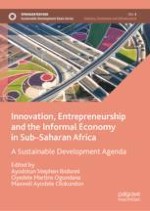Set against the backdrop of a rising population in Africa and the lowering opportunities for white collar jobs, as well as the continent’s limited access to resources, this edited collection demystifies the interconnectedness between the factors and actors involved with innovation and entrepreneurship development in sub-Saharan Africa’s (SSA) informal economy for more effective, result-oriented outcomes.
Exposing the underlying motivations that define uniqueness in Africa’s innovation and entrepreneurship ecosystem, particularly in the informal sector, the editors argue that there is a significant knowledge gap that this book seeks to fill, concerning institutionalization, motivational factors and the harnessing of the innovative potentials of Africa’s informal sector entrepreneurs and their supporting role in achieving a more sustainable African region
By identifying patterns of domesticating entrepreneurship theories and showcasing the latest research, the book covers a wide array of topics that discuss a multidisciplinary and multicultural perspective to entrepreneurship theory and practices in Africa. In this way the book contributes to the goals of SDG 9 ('Build resilient infrastructure, promote inclusive and sustainable industrialization and foster innovation') in Africa.
